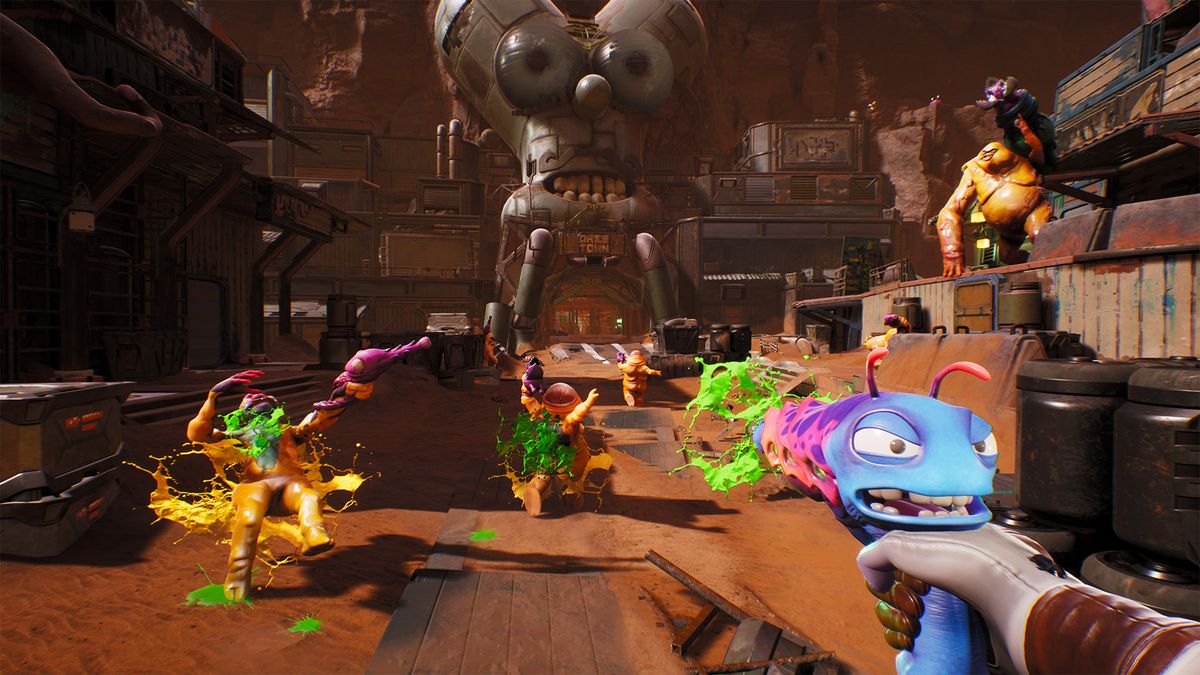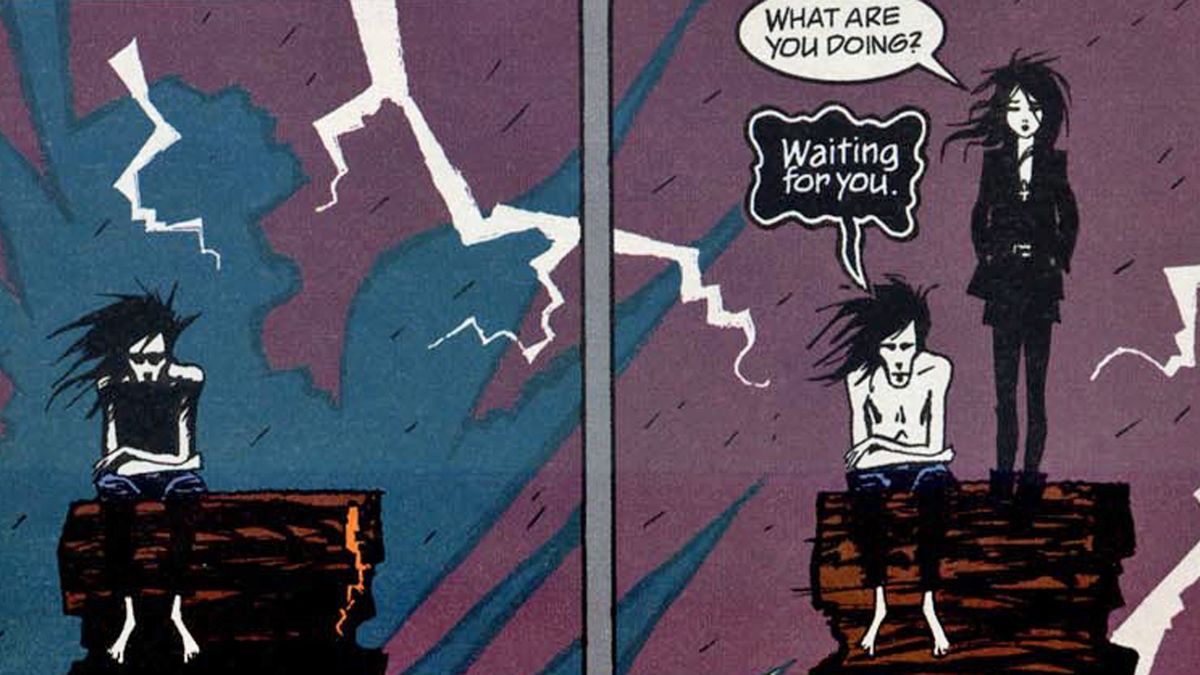
(opens in new tab)
There’s a new kind of zombie drama coming to BBC Three this Sunday at 10pm. One that asks, “What if zombies could get better ?” Because in In The Flesh , after the initial “Rising” when zombies rose from their graves and did all that massacring and flesh-eating schtick, scientists actually found a cure. Well, not a cure exactly, but a way of making zombies – euphemistically rebranded as suffering from “Partially Deceased Syndrome” (PDS) – more socially aware and less brain-fixated. Not that everyone in the post-Rising society is welcoming the “Rotters” back with open arms…
The creator of this clever new twist on zombie lore is TV scriptwriting newcomer Dominic Mitchell, who describes his show as “kitchen sink horror”, more Kes with the undead than Shaun Of The Dead . “I love Shaun Of The Dead and all those comedy zombie movies, but we wanted to approach it in a serious manner.”
In The Flesh has been in gestation a long time – up to five years, Mitchell reckons – and came about due to a BBC writing initiative called Northern Voices. “I’ve got a history of being in theatre. I’m a playwright, so this is my first TV thing ever. I heard about this scheme that the BBC Writers Room were doing called Northern Voices. It was a year-long thing, and it was to write an original 60-minute pilot drama. I’d always wanted to get into TV and I was like, ‘How do I do it?’ So I thought, ‘This is perfect!'”
He was teamed up with a mentor – Torchwood writer John Faye – and together they started to knock In The Flesh into shape. “I was so lucky to have him as a mentor; he loved the idea and really guided me through it.”
Part of that process was creating a series Bible. “I did all these patient information leaflets that the NHS would do, like, ‘Understanding Partially Deceased Syndrome’ – you know, those little leaflets that you go to in the GP’s office. That was a great thing to do actually, the series Bible, because you really cemented it in your head, the history of it, what happened and the back story, because so much has happened. Then it was greenlit, and I was like, ‘Oh wow, we’re going to actually do it! And in the Bible I was like, ‘I want it to be like kitchen sink horror.’
Domestic drama is not all there is to In The Flesh , though – it has its fair share of action and humour too.
“What’s great is you can have a really emotional scene between Kieren and his sister, then the next scene zombies are popping out of graves. So if you tire of the domestic-type, kitchen sink drama, you’re gonna have that action to counter-balance it. And dealing with it realistically, there’s going to be some really funny moments. We’ve got this great scene where a politician bumbles his way through this village meeting. So those kind of scenes you can take advantage of.”

(opens in new tab)
And don’t get the impression, from all those kitchen sink drama references and “I’m a playwright” soundbites, that Mitchell is a “serious artist” slumming it in telefantasy. In fact, he’s an unashamed horror geek.
“The first book I got into was Pet Sematary by Stephen King – I loved it. When I was 12 years old that was my favourite book – it’s still one of my favourite books – and that just got me into reading, really. Pet Sematary is sort of zombies, isn’t it? You know, the cat dies and then the cat comes back. I’m also a massive fan of Night Of The Living Dead and things like that. That’s always been the touchstone for In The Flesh ; we wanted it to be more like that and not 28 Days Later … which is fantastic, but we wanted to harken back to those original George Romero kind of zombies where they’re shuffling about and coming out of the grave. And it’s not a virus, it’s more a syndrome.”
The series opens four years after The Rising. After the cities were got back under control, two scientists called Halperin and Weston (named after the director and writer of 1932 film White Zombie !) created an antidote: a drug called neurotryptaline.
“It’s like in the Vietnam War, when they sprayed parts of Vietnam with Agent Orange. But then you had all these docile zombies shuffling about, and it was like, ‘Well, what do you do with them? You can’t kill them’. That’s when I thought people’s families would get involved and go, “Well that’s my son, that’s my mum, that’s my aunt’. So they put them in this holding centre in Norfolk. Then as they were treating them with this neurotryptaline they found out that people were coming back to themselves, and it became a treatment centre.”
Click on “Next” to read the second half of the feature.

Now PDS sufferers are being sent back to their families (complete with contact lenses and flesh tone mousse) in some kind of bizarre Care In The Community experiment.
“I was researching Care In The Community ,” says Mitchell, “and I was like, ‘Yeah, that’s what the government would do…’, especially now, with the budget cuts. And I’m sure if there was a zombie apocalypse… a war is a lot of money, especially on home turf. And I’m sure the government would be like, ‘Well, it’s very expensive to house these PDS sufferers…'”
We follow one of those PDS sufferers, teenaged Kieren, as he returns to the parochial Northern village of Roarton.
“Now that he’s back with his parents he’s sort of well but he’s taking medication. Because he’s on these drugs he’s getting these memories that are coming flooding back, which fill him with terrible guilt because he has eaten people.”
The exact cause of The Rising remains unexplained.
“We don’t really touch on that, just because we’ve got so much story about Kieren coming back to his family and what’s happening in the village and how they’re receiving this integration. We wanted to leave that as a mystery, really. With a lot of illnesses people don’t know what caused it; these phenomena just happen. What I quite like is that by not answering it, everyone has their interpretations of why it happened. When there is a vacuum, when people don’t know exactly why it happened, you get all of these extreme elements that come in and want to fill it, and that’s great for our drama.”
Some of the people who are least pleased to say Kieren making his homecoming have a religious explanation. One major antagonist is Bill Macy, head of the Human Volunteer Force, who fought against the zombies during The Rising.
“He’s still really in love with his role as commander of the Human Volunteer Force and doesn’t want to give that up, because it gave him status in the village. Bill was a hero, he organised people and said, ‘No, we’re not going to let any of these rotters come into our village’. I think if we did a prequel to this series they would be the heroes, because they’d be the ones battling the Rabids at the start of The Rising and protecting their families.”
Bill’s main ally is the local Vicar, played by Kenneth Cranham, who is very much a fire-and-brimstone type.
“Vicar Oddie believes it’s something to do with the apocalypse. He’s like, ‘They’re demons, they’ve got to be got rid of, they’re evil, they’re impostors, kill them’. It’s about interpretation. We’ve got another character called ‘The Prophet’, who we don’t actually see, but he’s in these YouTube videos. He’s a Partially Deceased Syndrome sufferer, but he’s very much like, ‘We are the chosen people’ and he references Revelations, the same book that Vicar Oddie is referencing, but he finds sections about the dead coming back to life and how they’re pure. So he’s like, ‘We should not be taking our medication – we are actually better than the living.'”
“I had to read Revelations to do the series, and it’s fascinating. There are passages about how the dead will come back and how they will be glorious. All these myths go back and go back. When I was researching it, it was really interesting to look at, because every ancient religious text has something about the undead and about resurrection – and zombies are that, they come back from the dead. I think that’s why it resonates, the zombie genre, because it’s embedded in our thing of wanting people to come back from the dead, and our desperate want for immortality.”
Ian Berriman/Dave Golder
In The Flesh debuts on BBC Three on Sunday at 9pm.

(opens in new tab)
Read our In The Flesh interview with star Luke Newberry.
Watch some In The Flesh public information films that give you lowdown on zombies.
 Game News Video Games Reviews & News
Game News Video Games Reviews & News



